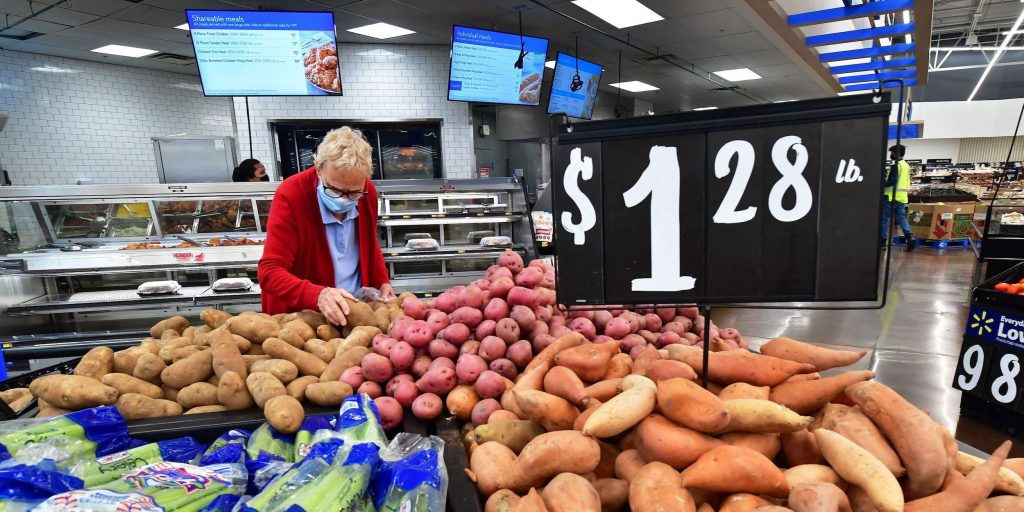- Two-thirds of households expect inflation to worsen over the next year, according to a new poll.
- Americans are adjusting their activity accordingly to avoid the impact of surging prices.
- Here are the top five ways households are preparing for even faster price growth.
The economy has shown signs of easing inflation, but Americans are still bracing for the price surge to worsen.
Inflation continues to run at the fastest pace in 40 years as supply-chain snags and Russia's invasion of Ukraine lift prices across the board. Soaring prices have dragged Americans' economic sentiments to the most pessimistic levels in a decade. And while some economists see March as representing peak inflation, most households aren't so hopeful.
Two-thirds of Americans expect the inflation problem to get worse over the next year, according to a new poll conducted by The Washington Post and George Mason University's Schar School of Policy and Government. Three-in-ten respondents said they expect inflation to get "much worse." Only 21% of households said they see the situation improving in the next year, and 12% said they expect the pace of price growth to generally stay the same.
The poll's findings cast a shadow over an otherwise encouraging economic outlook. The country added more jobs than expected in May, signaling the labor market is still recovering amid rising interest rates. Consumer spending — a crucial fuel for economic growth — has also held strong. Yet inflation can be influenced by Americans' expectations, and the new poll hints there's little hope for the price rally to slow.
Not only are households anticipating worse inflation, they're preparing for it. Here's how Americans are bracing for even faster price hikes in the months ahead, according to the new poll.
Searching for cheaper options
By far the most popular method for countering inflation was to spend more time hunting for deals, according to the poll. Eighty-seven percent of households said they put more effort into finding the cheapest price for products they buy. The shift has likely buoyed wholesalers and e-commerce giants like Costco and Amazon, as such businesses' ability to buy in bulk allows them to price goods lower than most brick-and-mortar retailers.
By comparison, 81% of Americans said the same in July of 2008, when the country was mired in the Great Recession.
Cutting back on unnecessary spending
Households are also reining in their spending on goods and services that are less important for day-to-day living. Seventy-seven percent of respondents said they decreased their spending on entertainment or eating out in recent months, according to the poll.
Should that trend intensify, service businesses could be in for a bumpier recovery. Such businesses have only recently started to rebound as Americans shift their spending from goods to services. Relatively low coronavirus infections opened the door for increased spending on in-person services, but if inflation keeps biting into Americans' finances, those businesses could see fallout from more cautious spending.
Delaying purchases
Even the spending that Americans were planning to do is being pushed back. Nearly three-quarters of surveyed households said they've put off purchases they were otherwise planning on. While that activity suggests Americans will revive their spending activity once inflation cools, a prolonged delay could starve the recovery of much-needed fuel.
Putting less cash aside for savings
Household saving boomed through the first year of the pandemic as lockdowns curbed in-person spending and stimulus bolstered Americans' finances. Inflation is now eating away at that trend.
Fifty-nine percent of respondents said they cut back how much they've been putting toward their savings in recent months. That's up from the 2008 level of 50%, signaling Americans are having a harder time building a financial buffer than they did during the Great Recession. Although household balance sheets remain fairly healthy, decreased saving could leave Americans less equipped to handle another downturn if one does arrive.
Easing up on energy use
Soaring energy prices have been one of the biggest contributors to today's sky-high inflation, and Americans have been adjusting their activity accordingly. Fifty-nine percent of households said they minimized their use of electricity and drove less to cut down on energy spending.
That reading shouldn't come as much of a surprise to anyone who has driven past a gas station in recent months. Gas prices hit a record-high nationwide average of $4.97 per gallon on Thursday, according to AAA. That's up nearly $2 from levels seen one year ago. The upward trend has shown no signs of stopping, either, as Americans' demand for gas continues to outstrip supply. Until prices fall back to more sustainable levels, cutting down on driving will likely remain one of the best ways to avoid high inflation.

